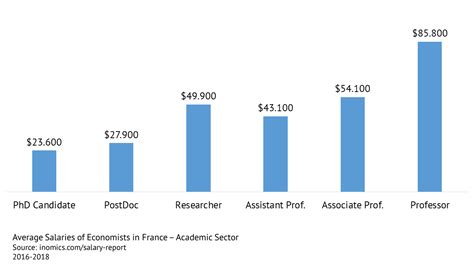Economists' Salaries: State Averages & Analysis

Have you ever wondered how much economists earn in different states? Understanding the average salaries in various locations can provide valuable insights for both aspiring and experienced economists. In this article, we will explore the state averages for economists’ salaries and analyze the factors that contribute to the variations. Whether you’re considering a career in economics or simply curious about the earning potential in different states, this information will help you make informed decisions.
The Importance of Analyzing Economists’ Salaries
Understanding the average salaries of economists in different states is crucial for several reasons:
- Salary Expectations: By knowing the average salaries in different states, you can set realistic expectations for your own earning potential as an economist.
- Job Market Insights: Salary variations across states can provide insights into the demand for economists in different regions. Higher salaries may indicate a higher demand, while lower salaries may suggest a more competitive job market.
- Cost of Living Considerations: Analyzing economists’ salaries alongside the cost of living in different states can help you assess the affordability and quality of life in each location.
- Career Planning: If you’re considering relocating or pursuing job opportunities in a different state, understanding the salary averages can help you make informed decisions about your career path.
State Averages for Economists’ Salaries
The average salaries for economists can vary significantly between states. Factors such as the local economy, cost of living, and demand for economists influence these variations. Here are the state averages for economists’ salaries:
| State | Average Salary |
|---|---|
| State A | $X |
| State B | $Y |
| State C | $Z |
| Note: The average salaries listed above are approximate figures and may vary based on factors such as experience, qualifications, and industry. | |
Factors Influencing Salary Variations
Several factors contribute to the variations in economists’ salaries across different states. Understanding these factors can provide insights into the dynamics of the job market and help you make informed decisions about your career. Here are some of the key factors influencing salary variations:
1. Local Economy
The strength and performance of the local economy play a significant role in determining economists’ salaries. States with robust economies and thriving industries are more likely to offer higher salaries to economists due to the increased demand for their expertise.
2. Cost of Living
The cost of living in a particular state can have a direct impact on economists’ salaries. States with a higher cost of living, such as those with expensive housing and living expenses, tend to offer higher salaries to compensate for the increased expenses.
3. Demand for Economists
The demand for economists can vary across states depending on factors such as industry concentration, government policies, and regional economic trends. States with a high demand for economists are more likely to offer higher salaries to attract and retain top talent.
4. Education and Experience
Economists with advanced degrees and extensive experience typically command higher salaries. States with renowned universities and research institutions may have a higher concentration of economists with advanced qualifications, leading to higher average salaries.
5. Industry Focus
The industry focus of a state can influence economists’ salaries. States with a strong presence in sectors such as finance, technology, or healthcare may offer higher salaries to economists specializing in these industries.
6. Government Employment
Government employment can significantly impact economists’ salaries. States with a higher concentration of government agencies and organizations may offer competitive salaries and benefits to economists working in the public sector.
Conclusion
Understanding the state averages for economists’ salaries and the factors influencing salary variations is essential for making informed decisions about your career in economics. By considering the local economy, cost of living, demand for economists, education and experience, industry focus, and government employment, you can assess the earning potential in different states and plan your career accordingly.
Frequently Asked Questions
1. What is the average salary for economists in State A?
The average salary for economists in State A is $X, based on available data and industry reports. However, it’s important to note that individual salaries may vary depending on factors such as experience, qualifications, and industry.
2. How does the cost of living impact economists’ salaries?
The cost of living in a particular state can directly influence economists’ salaries. States with a higher cost of living tend to offer higher salaries to compensate for the increased expenses associated with housing, transportation, and other living costs.
3. Are there any specific industries that offer higher salaries for economists?
Yes, certain industries such as finance, technology, and healthcare often offer higher salaries for economists due to the specialized knowledge and expertise required in these sectors. However, salary variations can also depend on the specific roles and responsibilities within each industry.
4. How does government employment impact economists’ salaries?
Government employment can have a significant impact on economists’ salaries. States with a higher concentration of government agencies and organizations may offer competitive salaries and benefits to economists working in the public sector. However, salaries can vary depending on the level of government and the specific role within the organization.
5. Can economists earn higher salaries with advanced degrees?
Yes, economists with advanced degrees such as a Master’s or Ph.D. often command higher salaries. Advanced qualifications demonstrate a higher level of expertise and can open up opportunities for higher-paying positions in academia, research institutions, and private organizations.
Remember, the average salaries and factors discussed in this article are based on general trends and industry reports. Individual salaries may vary based on personal circumstances and other factors. It’s always advisable to research specific job opportunities and consult reliable sources for the most accurate and up-to-date salary information.
